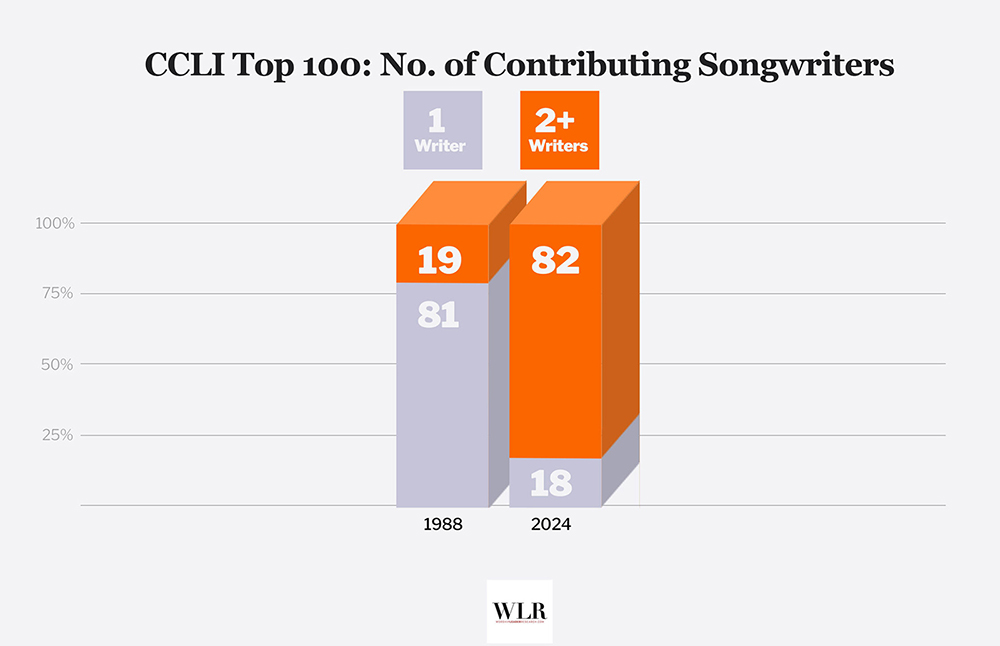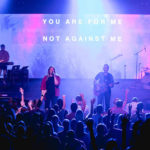(RNS)—In January 2023, Chris Brown and a group of fellow songwriters working on a live worship album for Elevation Church, a nondenominational megachurch in Charlotte, N.C., sat down for a writing session.
In the room with Brown were Pat Barrett, Chandler Moore, Brandon Lake and Cody Carnes, authors of such worship staples as “Good, Good Father,” “Build My Life” and “The Blessing,” which can be heard in churches of every size and stripe across the United States.
During the session, Brown pulled out a song that he, Lake and Elevation’s pastor, Steven Furtick, had been batting around for a year with little success. Tinkering with it that day in January, they decided the result, which combines soaring vocals over a galloping beat, was good enough for the album but, said Brown, “We really didn’t see it doing much.”
On stage at Elevation, moments before they debuted it, at a live recording session for the new album, they were still piecing together the song’s opening. But backed by a choir and gaining energy from the live audience, the song took off.
“We left that night going, ‘That was crazy, but we’re still going to put it at the end of the album,’” said Brown.
The song, “Praise,” has since become just the latest example of the power of a tight coterie of songwriters in Christian music, who have increasingly worked together to produce hits.
A live video of “Praise,” recorded that night and posted on YouTube in May 2023, has been viewed 103 million times, and the song, having topped the Billboard Hot Christian Music chart for 25 weeks, has been nominated for a song of the year Dove Award by the Gospel Music Association.
In recent years, songs from the so-called Big Four megachurches—Elevation; Bethel Community Church in Redding, Calif.; Hillsong, a megachurch headquartered in Australia; and Passion City Church in Atlanta—have dominated the Top 25 lists for Christian Copyright Licensing International and PraiseCharts, which track what songs are played in churches.
An academic song tracking effort, Worship Leader Research, wrote in a new report that 82 percent of the songs on the CCLI Top 100 in 2024 had at least two writers. When the CCLI Top 100 chart debuted in 1988, only 19 percent had more than one writer—and most of those were written by the legendary gospel music team of Bill and Gloria Gaither.
Sign up for our weekly edition and get all our headlines in your inbox on Thursdays
 The “Praise” co-writers Brown, Barrett, Furtick, Carnes, Moore and Lake, like most of the collaborators on recent Top 25 hits, have ties to the Big Four.
The “Praise” co-writers Brown, Barrett, Furtick, Carnes, Moore and Lake, like most of the collaborators on recent Top 25 hits, have ties to the Big Four.
“What started as a large pool of individuals contributing their voices to the contemporary worship soundscape eventually became a collection of interconnected enclaves,” according to the Worship Leader Research report.
Many songwriters largely unknown to worshippers
Many of the most successful worship songs have become more associated with the churches that produced them than the songwriters who wrote them.
Jason Ingram, lead singer of the Christian band One Sonic Society, has co-written the hits “Goodness of God” and “Great Are You Lord” to go with more than a dozen of the songs highlighted in the Worship Leader Research study, but he remains relatively unknown in the public eye.
Other successful Christian songwriters such as Ed Cash, co-writer of “Goodness of God” and “How Great Is Our God,” or Jonas Myrin, who co-wrote “Cornerstone” and “10,000 Reasons” and later went on to write for Barbra Streisand, also have relatively low profiles.
Since many churches don’t use hymnals or print music in bulletins—the lyrics tend to be projected on screens around their sanctuaries—congregations don’t always see the names of writers.
“I think the reason why Jason Ingram isn’t considered a household name in general is—especially if you’re a congregant and never even looking at a chord chart—you’ll never see his name, even though he’s around,” said Shannan Baker, a postdoctoral fellow at Baylor University and member of the Worship Leader Research team.
Marc Jolicoeur, a worship pastor from New Brunswick, Canada, and member of the research team, theorizes co-writing is more liable to transform a songwriter’s solo inspiration into something that feels accessible for congregations. He cited a writer’s saying that one should write with the door closed, but rewrite with the door open.
“There’s the idea that many hands won’t just make light work but will make work that might rise to the top,” he said, adding writers often show up to co-writing sessions with works in progress that just need a bit of help to work.
The presence of a well-known co-writer also may help a worship song get more notice, Baker said. She pointed to the ongoing popularity of “Great Are You Lord,” by David Leonard and Leslie Jordan, both of the band All Sons and Daughters, and Ingram.
“I think that song, in and of itself, is a perfect example of the power of a career songwriter, elevating a song,” she said. “All Sons and Daughters had a following, but the minute you add Jason Ingram into that mix, they have a hit.”
Brown, who helps produce Elevation’s worship songs, said he had great respect for past songwriters who wrote on their own, but he appreciates the chance to collaborate with friends and fellow writers. The church, he said, has helped create an environment where that can flourish.
Brown said that’s in large part because the church—and not an outside music label—controls the creative process. If a song or an album is not ready, the church isn’t under pressure to release it.
“We are our own label, so to speak,” he said. “It’s always been that creativity is king.”
Doing the songwriting at the church rather than in a Nashville writing room helps as well, he added. Brown said he doesn’t mean to knock Nashville, which is a hub of songwriting, but said the feel of the church’s writing room is more hospitable and more open to inspiration.
“We worked hard through the years to create an environment where the goal is to go away having enjoyed this day together, feel spent and hopefully inspired,” he said.
In co-writing, Brown said he often learns from others—how they create melodies or find the right cadence to the lyrics or just the right words to make a song better.
“If I partner with someone else creatively or with several other people, there’s a chance it can turn into something even greater—or go in a way that I never saw it going,” he said. “Not to over-spiritualize it, but I think it’s cool to acknowledge that we need each other.”
And in the process, something unexpected may appear.















We seek to connect God’s story and God’s people around the world. To learn more about God’s story, click here.
Send comments and feedback to Eric Black, our editor. For comments to be published, please specify “letter to the editor.” Maximum length for publication is 300 words.